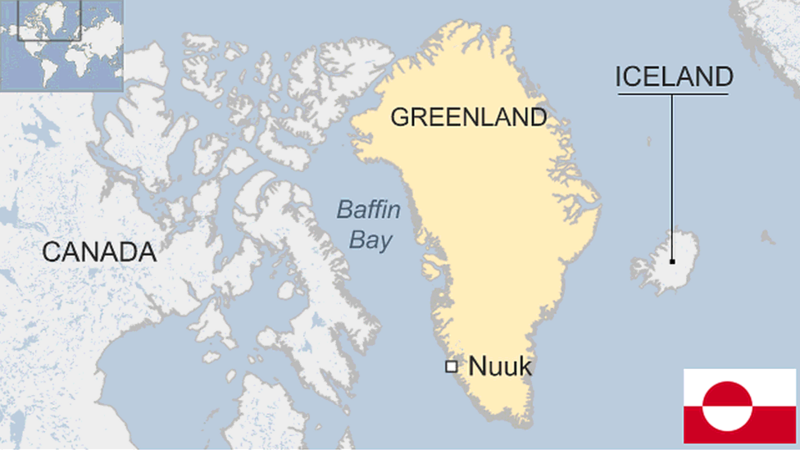File:BBCcmpGreenland8.png

Original file (976 × 549 pixels, file size: 73 KB, MIME type: image/png)
Summary
Original picture: https://ichef.bbci.co.uk/ace/standard/976/cpsprodpb/550C/production/_128327712_bbcmp_greenland.png
Compressing command:
convert _128327712_bbcmp_greenland.png png8:BBCcmpGreenland8.png
Original description
Greenland is the world's largest island and an autonomous Danish dependent territory with self-government and its own parliament.
Though a part of the continent of North America, Greenland has been politically and culturally associated with Europe - in particular the two colonial powers, Norway and Denmark - since the 9th Century.
Denmark contributes two-thirds of Greenland's budget revenue, the rest coming mainly from fishing. Potential oil, gas and rare earth mineral reserves have attracted prospecting firms.
Greenland enjoys perpetual daylight for two months each year. Over 80% of the island is covered by a permanent ice cap 4km thick in places. Global warming is causing this to melt but has also increased access to Greenland's mineral resources.
The US has long seen Greenland as strategically important and established a radar base at Thule during the Cold War. With the melting of the ice around Greenland, the possibility of new trade routes opening has increased the Arctic's importance. Read more country profiles, external - Profiles by BBC Monitoring, external
GREENLAND: FACTS
Capital: Nuuk
Area: 2,166,086 sq km
Population: 57,000
Languages: Greenlandic, also Danish and English
Life expectancy: 71 years (men) 76 years (women)
References
- ↑ https://www.bbc.com/news/world-europe-18249474 Greenland profile Published 10 January (2025) Greenland is the world's largest island and an autonomous Danish dependent territory with self-government and its own parliament.// Though a part of the continent of North America, Greenland has been politically and culturally associated with Europe - in particular the two colonial powers, Norway and Denmark - since the 9th Century.// Denmark contributes two-thirds of Greenland's budget revenue, the rest coming mainly from fishing. Potential oil, gas and rare earth mineral reserves have attracted prospecting firms.// Greenland enjoys perpetual daylight for two months each year. Over 80% of the island is covered by a permanent ice cap 4km thick in places. Global warming is causing this to melt but has also increased access to Greenland's mineral resources. The US has long seen Greenland as strategically important and established a radar base at Thule during the Cold War. With the melting of the ice around Greenland, the possibility of new trade routes opening has increased the Arctic's importance.// Read more country profiles, external - Profiles by BBC Monitoring, external// GREENLAND: FACTS// Capital: Nuuk// Area: 2,166,086 sq km// Population: 57,000/ Languages: Greenlandic, also Danish and English// Life expectancy: 71 years (men) 76 years (women)
Keywords
«Annexation of Greenland», «BBC», «Greenland», «[[]]»,
File history
Click on a date/time to view the file as it appeared at that time.
| Date/Time | Thumbnail | Dimensions | User | Comment | |
|---|---|---|---|---|---|
| current | 10:43, 13 February 2025 |  | 976 × 549 (73 KB) | T (talk | contribs) | {{oq|BBCcmpGreenland8.png|}} Map of Greenland by BBC <ref name="bbcMap"> https://www.bbc.com/news/world-europe-18249474 Greenland profile Published 10 January (2025) Greenland is the world's largest island and an autonomous Danish dependent territory with self-government and its own parliament.// Though a part of the continent of North America, Greenland has been politically and culturally associated with Europe - in particular the two colonial powers, Norway and Denmark - since the... |
You cannot overwrite this file.
File usage
The following page uses this file: